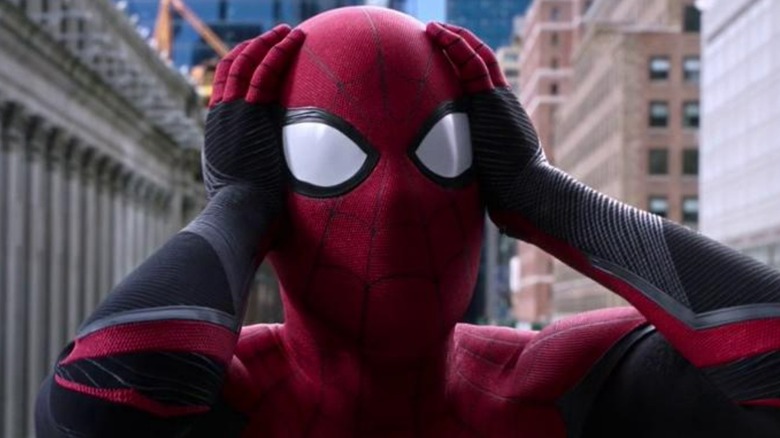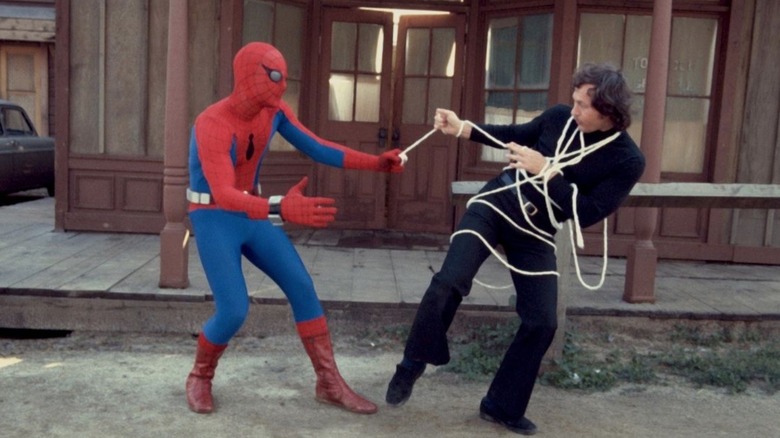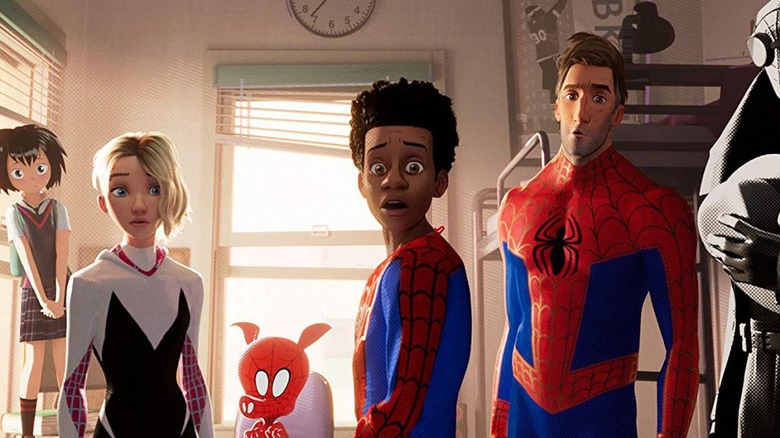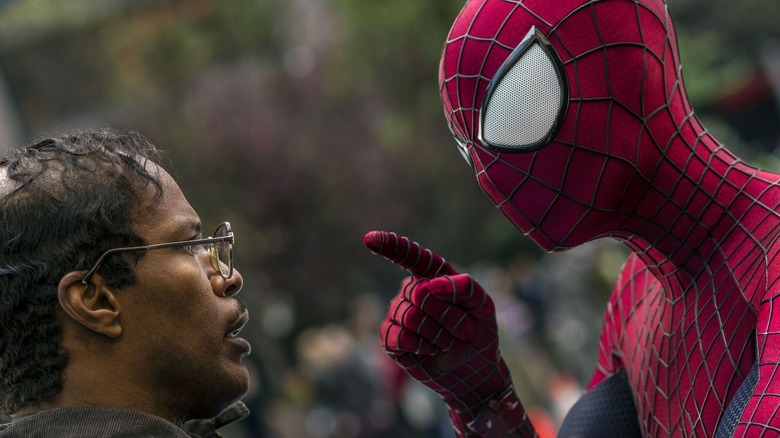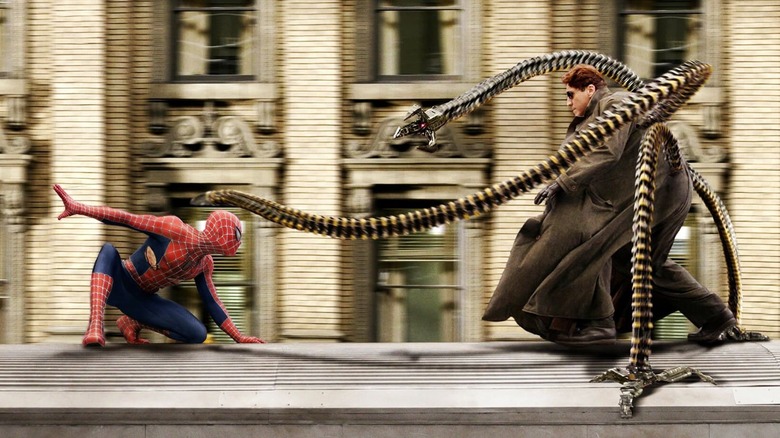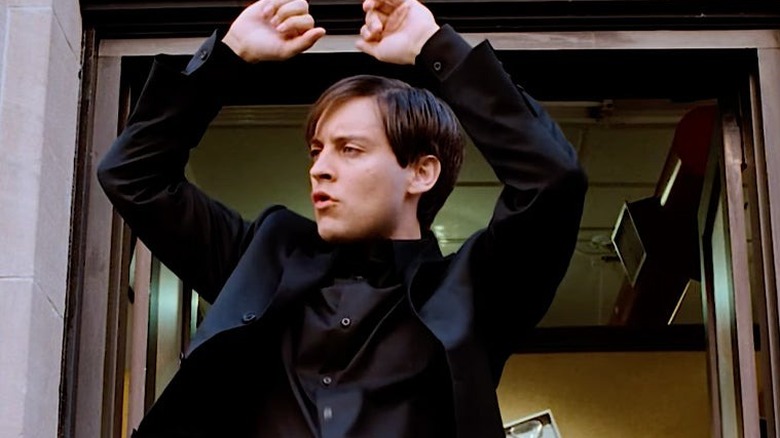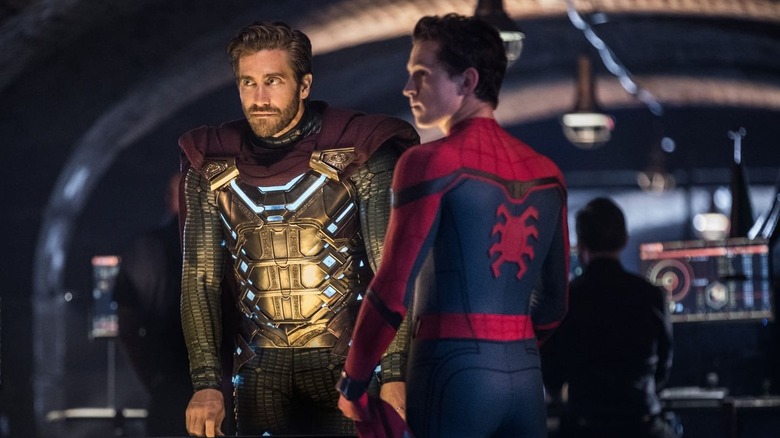Ranking Spider-Man Movies By How Much Money They Made At The Box Office
You know the words: "Spider-Man, Spider-Man, does whatever a spider can ..." Well, turns out what a spider does is make an insane amount of money. According to The Numbers, the nine-film Spider-Man franchise (including the three MCU films) has spun up over $3.2 billion domestically and $8 billion worldwide, making it the fourth biggest of all time, behind only the entire 38-film MCU, "Star Wars" and "Harry Potter." Throw in the two-film "Venom" franchise ($427 million domestically; $1.3 billion worldwide) and Peter Parker could buy the Daily Bugle from J. Jonah Jameson and never have to worry about selling pictures again. Plus, Spider-Man tops Batman as the highest-grossing solo superhero franchise.
Spider-Man movies have also broken the opening weekend record twice ("Spider-Man" and "Spider-Man 3"), behind only "Batman" (four times), "The Avengers" and "Jurassic Park" (three times each), and tied with "Harry Potter." Perhaps most impressively, after 11 films and 20 years, no Spider-Man movie has drawn flies. Each was a massive money-maker, just some caught more moviegoers than others. Spider-Man's only competition is himself, so we're counting down the Spider-Man movies — including the two Venom movies since he's a Spider-Man character — to see which Spider-Man climbs the highest.
Before we start, here's your spoiler alert for any Spider-Man movie you haven't seen yet.
Spider-Man's not-so-amazing cinematic start
Spider-Man seems like the biggest sure thing in movie history, so why'd it take so long to bring him to the big screen? It wasn't for a lack of trying. Spider-Man was in developmental hell for decades, going back to the 1970s, with three cinematic spin-offs to "The Amazing Spider-Man" TV series starring Nicholas Hammond (why wasn't he in "Spider-Man: Far From Home?"): "Spider-Man," "Spider-Man Strikes Back," and "Spider-Man: The Dragon's Challenge." We won't include those in our list since they were really just combined episodes of the TV show and were only released overseas (and probably made less than Marvel president Kevin Feige carries in his wallet).
This "trilogy" launched bitter battles between studios for film rights, as Spider-Man was always considered Marvel's golden goose. At some point in the early 1990s, a post-Terminator, pre-"Titanic" James Cameron got involved with a "scriptment," and a few of his ideas remain — notably Spidey's organic web shooters. However, Cameron eventually skipped Spider-Man and steered his ship into a giant iceberg instead. Sony got the rights from MGM essentially in exchange for James Bond (a tete-a-tete with studio lawyers going to court), with directorial duties eventually going to Sam Raimi.
11. Spider-Man: Into The Spider-Verse
The lone animated film on this list (unless you count the CGI used in every Spider-Man movie) is also the lowest-grossing — and arguably the most celebrated. More on that in a second. "Spider-Man: Into The Spider-Verse" opened in 2018, the first Spider-Man movie released during the holiday season, as the rest were summer blockbusters. Crunched between Spider-Man's eagerly anticipated solo MCU debut, "Spider-Man: Homecoming" in 2017 and "Spider-Man: Far From Home" in 2019, "Into The Spider-Verse" had an air of "Really, another Spider-Man movie?" Couple that with it being the first Spider-Man movie not centered around Peter Parker (Miles Morales was the main man in the suit) and "Into The Spider-Verse" grossed "only" $35 million in its opening weekend.
However, this itsy bitsy spider had long legs. Powered by the best reviews in the series, "Into The Spider-Verse" had a 5.4 domestic multiplier (meaning it earned 5.4 times its opening weekend at the domestic box office), the best in the series — and crawled its way to $190 million domestically and $375 million worldwide. See kids, if your movie is good it'll still make money after a soft opening (provided it's about Spider-Man). Using the rule-of-thumb that a movie has to make twice its product budget to make money, we estimate "Into The Spider-Verse" made $195 million on its $90 million budget. More impressively, it beat out animation heavyweight Pixar's "Incredibles 2" to win Best Animated Feature at the Oscars.
10. Venom: Let There Be Carnage
Following the massive grosses "Venom" earned in 2018, Sony formed a symbiotic relationship with the "Spider-Man" spin-off. Meanwhile, the prerequisite post-credit scene featuring Woody Freakin' Harrelson as Cletus Kassidy, the serial killer who becomes Carnage, left fans slobbering for more. Despite several delays, fans propelled "Venom: Let There Be Carnage" to a $90 million opening weekend.
This was the best opening of the Covid-era, until it was smashed a few weeks later by Venom's foe, the friendly neighborhood Spider-Man. Foiled again! We doubt Sony cared. "Let There Be Carnage" matched the $213 million domestic take of "Venom" almost exactly (not accounting for four years of inflation), which is pretty wild, though its $501 million worldwide was more than $350 million less. Blame the fact the sequel didn't play in China, where "Venom" earned $270 million in 2018. But thanks to its insanely cheap $110 million budget, we estimate "Venom: Let There Be Carnage" earned $281 million in profit. Let there be Carnage? More like let there be cash!
9. The Amazing Spider-Man 2
"The Amazing Spider-Man 2" has a bad reputation, that is until moviegoers suddenly fell in love with Andrew Garfield's Peter Parker after "Spider-Man: No Way Home." But is it deserved? Well, "ASM 2" does have the worst reviews of the series. It also squashed Sony's dreams of an "Amazing Spider-Man" trilogy. Oh, and it only earned $202 million domestically, the lowest domestic haul of the live-action Spider-Man movies by about sixty million dollars. So yeah, with all of that "going" for it, you'd be safe in saying that "ASM 2" was underwhelming.
However, "fail" is a relative term. "ASM 2" cost $200 million, so with $708 million worldwide it still earned a massive $308 million profit, more than enough to justify a three-quel on raw numbers alone. However, it was also a downward drop from "The Amazing Spider-Man," which was already a downward drop from "Spider-Man 3." Sony realized fans weren't excited about this Spider-Man (again, until "No Way Home"), but were showing up more out of obligation. Sony later made a deal with Disney. The result was the $1.15 billion earned by "Captain America: Civil War." We'd say that was a good call.
8. The Amazing Spider-Man
"Why was there no Spider-Man 4?" is one of the most repeated questions in internet movie culture, second only to "does George Lucas hate his fans?" It was actually Raimi himself who nixed the project. According to Deadline, Raimi didn't believe he could maintain the series' creative integrity and hit its May 2011 release date. When your trilogy earns $2.5 billion you carry a lot of clout, so the Sony/Raimi breakup wasn't a bitter divorce but a "let's see other people."
So with Raimi, and consequently Tobey Maguire out of the Spider-Man business, Sony decided to reboot the franchise from scratch and go back to the start. A "Spider-Man Begins," if you will. The result was "The Amazing Spider-Man." Despite being anchored by the uber-charismatic and talented Andrew Garfield and Emma Stone, the film couldn't shake the cobwebs of feeling like it was made just to make money. Which it did, to be sure. "ASM" earned $262 million domestically and $757 million worldwide, the lowest domestic take in the series at that point by $84 million, but still profitable (about $317 million) with a $220 million budget. For Spider-Man that's okay ... but hardly "Amazing."
7. Spider-Man 2
"Spider-Man 2" may not have been the biggest moneymaker in the series, but its contribution to comic book cinematic culture is arguably the largest. Its Rotten Tomatoes critics score and audience score are one of the highest ever for any superhero movie at the time, and frankly still are today. In fact, critics liked it even more than audiences. This included a four out of four star review from Roger Ebert, who said it was "...the best superhero movie since the modern genre was launched with 'Superman.'" Ebert even put it number four on his year-end top ten list. That may not seem like such a big deal in a post-"The Dark Knight" world, but at the time it was a huge credibility boost.
Ebert wasn't the only critic who loved it, not by a long shot. However, it was far more than a critical darling: "Spider-Man 2" was still a massive money earner. Its $88 million opening weekend was lower than "Spider-Man" since it opened on a Wednesday, and it swung away with $373 million domestically and $794 million worldwide. A bit below "Spider-Man" in 2002, but that's hardly surprising considering that movie was powered by literal decades of pent-up demand. Though "Spider-Man 2" was a cash cow, its true legacy was bringing four-star quality to the superhero genre.
6. Spider-Man
While superhero movies and TV shows make up almost all of our entertainment content today, that was not always the case. It's hard to explain to younger fans just how barren the comic book movie landscape was before "Spider-Man." The superhero genre was pretty much dead after "Batman & Robin" laid a glowing neon-painted, Bat-nippled egg in 1997. The "Blade" films brought back some credibility, but an R-rated vampire killer hardly screamed mainstream appeal. Then came "X-Men," which earned $296 million worldwide on a $75 million production budget in 2000 — hardly uncanny, but proof there was still life in the superhero genre. And then came "Spider-Man."
Sony expected a hit (that's why they bought the character) but nobody could have predicted how big a hit they got. "Spider-Man" opened to $114 million, the highest-grossing opening weekend ever and the first to open more than $100 million. It went on to earn $403 million domestically (number four all time, at the time) and $821 million worldwide. The domestic take for "Spider-Man" was Sony's best for 16 years until "Jumanji: Welcome To The Jungle" overtook it (and only due to inflation). Adjusted for inflation, "Spider-Man" made $1.2 billion. However, the ripple effect of "Spider-Man" went far beyond Sony's studio lots. "Spider-Man" didn't just revive the superhero genre — it launched a new era.
5. Venom
We can debate who among Spider-Man's rogues gallery is his arch enemy ... actually, no we can't, it's the Green Goblin. However, his most famous foe is probably Venom. Yes, the record-setting grosses of "Spider-Man: No Way Home" were powered in part by Willem Dafoe's gleeful return to the glider, but there were other big returns in that film too. And let's face it, a Green Goblin solo movie wouldn't be as big a hit as a Venom movie. So now that we've insulted the Silver Age fans, and pleased the '90s era fans who still own Venom tees bought from Hot Topic, let's talk about the Venom films.
Venom's first cinematic appearance in the Spider-Man franchise as one of the fifty villains (give or take) in "Spider-Man 3" left fans feeling underwhelmed. Maybe because he was given about as much screen time as Bruce Campbell's comic relief French maitre d', or maybe because Eric Forman from "That 70s Show" doesn't scream "hulking alien monster." Anyway, cut to 2018 with Tom Hardy in the role, and Venom became the textbook (or comic book) definition of "critic proof." Its critical reception was atrocious, but fans loved it, giving "Venom" an $80 million opening weekend, $213 million domestic gross, and $853 million worldwide. Perhaps most impressively, it earned a sequel, the surest sign of a film's success. With numbers like that, we imagine Sony will cling to Venom the way a symbiote clings to Eddie Brock.
4. Spider-Man: Homecoming
Sony and Disney's deal to bring Spider-Man to the MCU is more complicated than how a teenager turns into a superhero after being bit by a radioactive spider. All that matters to fans is that it happened. The world famous wall-crawler debuted in "Captain America: Civil War" and then got his own starring feature in 2017's "Spider-Man: Homecoming." It was certainly a homecoming.
After the so-so (for Spider-Man) performance of "The Amazing Spider-Man" movies, "Homecoming" brought the world famous wall-crawler back to his winning ways. By injecting some much-needed sarcastic humor into the series (fans always loved Spider-Man for his snarky one-liners), "Spider-Man: Homecoming" earned raves from critics and fans. It also made the most money of any Spider-Man movie since the Sam Raimi/Tobey Maguire days ten years before. In fact, it made more than those movies (unadjusted for inflation) except for one, with $334 million domestically and $878 million worldwide. Not bad for a character now in his sixth movie and third series.
3. Spider-Man 3
History has not been kind to "Spider-Man 3." Though it's incorrect to say this film killed the Sam Raimi/Tobey Maguire Spider-Man films (Sam Raimi did that himself), it's not incorrect to say the movie left a sour taste in moviegoer's mouths. Its Rotten Tomatoes critics and audience scores were the worst in the franchise at that point, with its audience score in particular being a rare "Rotten." However, at the box office where it mattered, the web swinger was still a big winner. In fact, "Spider-Man 3" was the biggest worldwide hit of the entire Raimi/Maguire trilogy, with $894 million worldwide. However, its domestic take had to be considered a little disappointing.
The film opened to a record-breaking $151 million, but due to mediocre word-of-mouth plus stiff competition from "Shrek The Third" and "Pirates of the Caribbean: At World's End" (man, May 2007 was stacked), it "only" made $336 million domestically. That's a 2.2 multiplier compared to 3.5 for "Spider-Man" and 4.2 for "Spider-Man 2." Moviegoers were excited to see "Spider-Man 3," but weren't so keen to come back again. Guess they didn't like emo Peter Parker, the Stay Puft Sandman, a Venom that clearly skipped the gym, and an inexplicable jazz hand dance numbers.
2. Spider-Man: Far From Home
"Spider-Man: Homecoming" brought the web-slinger back home to moviegoers' good graces. "Spider-Man: Far From Home" sent him away to Europe, though still in moviegoers' good graces. In between "Homecoming" and "Far From Home," Spider-Man had been snapped out of existence and then snapped back by Thanos. After being turned into dust for five years, Peter Parker figured he deserved a vacation and we're inclined to agree. So "Far From Home" takes place across the pond, and featured the cinematic debut of one of his most famous foes: The fish bowl-headed magician, Mysterio.
While a sequel to "Homecoming" in 2017, "Far From Home" benefitted way more from being Marvel's first follow-up to the record-breaking run of "Avengers Endgame" just a few months before. Being the sequel to the then-highest grossing movie ever is not a bad card to play, and Spider-Man's super popular anyway. Despite being the third "Spider-Man 2" movie in 15 years, Spidey's fans remained unfatigued. "Far From Home" opened to $92 million and had a strong 4.2 multiplier (one of the best in the MCU, much better than "Avengers Endgame" or even "Black Panther") to hit $390 million domestic and $1.13 billion worldwide.
1. Spider-Man: No Way Home
How many times can a franchise make history? That was the question on everybody's minds when "Spider-Man: No Way Home" opened. Turns out that nine films in, ol' Spidey still had a lot of webbing left in his shooter. Opening during the coveted Christmas season frame, only the second Spider-Man movie to do so and the first live-action, "No Way Home" was forecasted to make $130 million. That would have made its opening weekend the pandemic-era best by a big margin, but it wound up being one of the best, period, of any era.
"No Way Home" opened to $260 million, second only to "Avengers Endgame." Which is appropriate, as "Far From Home" was the "Endgame" of the Spider-Man series, bringing together the entire nine-film franchise in a way that was so stunningly satisfying we're still shocked it even happened. "No Way Home" became the movie of the 2021 holiday season, and 2021 in general, out-grossing the runner-up "The Battle at Lake Changjin" by nearly $800 million. With well over $750 million domestic and more than $1.7 billion worldwide, "No Way Home" is the highest-grossing film of the Spider-Man franchise unadjusted and adjusted for inflation. Which is appropriate, as "Spider-Man: Now Way Home" didn't belong to one Spider-Man franchise. It belonged to all of them.
